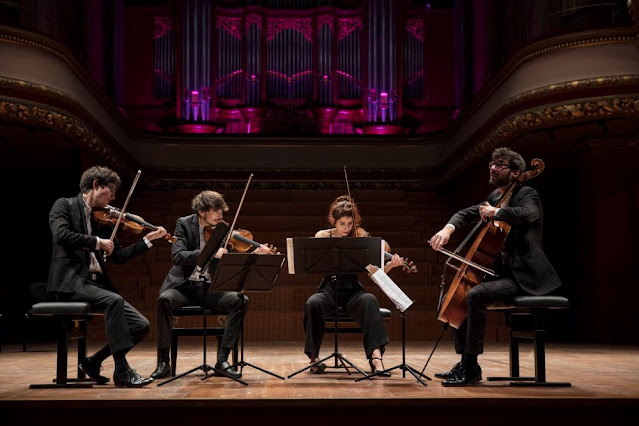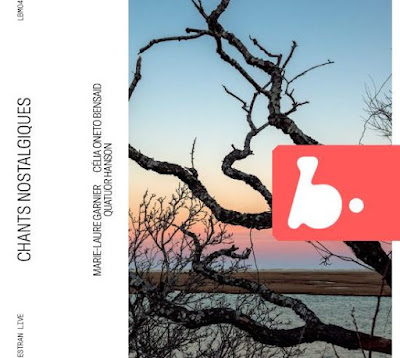 |
| Quatuor Hanson (Jules Dussap, Simon Dechambre, Gabrielle Lafait, Anton Hanson ) |
Having already released discs of quartets by Haydn (All Shall Not Die), Ligeti, Bartok, and Dutilleux (Not All Cats Are Grey) as well as George Crumb's Black Angels, the French ensemble, Quatuor Hanson, joined forces with soprano Marie-Laure Garnier and pianist Célia Oneto Bensaid to release Chants nostalgiques on the b records label, featuring music by Chausson, Faure and Charlotte Sohy. The centrepiece of the disc is composer Franck Villard's transcription of Ernest Chausson's Poème de l’amour et de la mer for voice, piano and string quartet, and the companion pieces feature Chausson's Chanson perpetuel, Fauré's La Bonne Chanson and Sohy's Chants nostalgiques.
Anton Hanson, the first violin in the quartet, explains that the repertoire for the disc was selected very much in discussion with Marie-Laure Garnier and Célia Oneto Bensaid. All six are friends, having known each other since being students at the Paris Conservatoire. The disc was intended to feature the first recording of Villard's transcription of the Chausson Poème which Anton enjoys like this. He has played in the original orchestral version of the Poème and whilst you do not get the operatic and symphonic sweep of the original, the chamber version brings lots of freedom to the individual lines. He describes the music as very linear, with lots of horizontal lines and it was lovely to try the flexibility of the chamber transcription. Also, it is rare to have such a large-scale piece for these small forces. Usually, they are playing short pieces or song cycles, but here it is a single long sweep. It was a nice challenge, having to tell a long story.
Alongside this, they placed the work by Charlotte Sohy (1887-1955). A cousin of Louis Durey, from Les Six, and a friend of Nadia Boulanger, Sohy studied with organ Alexandre Guilmant and Louis Vierne, and composition with Vincent d'Indy. Her Chants nostalgiques, setting texts by Cyprien Halgan, dates from 1910. It was a work discovered by Célia Oneto Bensaid who has exploring music by women composers from the 19th and early 20th-century. Anton describes it as a little curiosity, they read it through at their first rehearsal and decided to include it in the recording. For women of the period, it was so difficult to study composition that their music can often seem rather academic, but Sohy's is a bit avant-garde, out of the ordinary.
 |
| Quatuor Hanson (Photo: Anne-Laure Lechat) Anton Hanson, Jules Dussap, Gabrielle Lafait, Simon Dechambre |
Gabriel Fauré's La Bonne Chanson is simply great French music and it is so particular. The cycle of nine songs setting texts by Paul Verlaine was originally written for the soprano Emma Bardac; Fauré was in love with her, but she married Debussy! Anton explains that the quartet enjoys working with texts, and the fact that here it is in French helped their understanding, they didn't need to study the original text. And this brings a different feel when performing the work, they have a stronger connection to the sung text. Fauré's original was for soprano and piano, and he later created a version for voice, piano and string quintet, but there are various versions in different keys depending on the voice type. They tried several different ones, but here are playing Fauré's own version for mezzo-soprano, piano and string quartet.
The quartet already has some of Chausson's chamber music in their repertoire as they play the Concerto for violin, piano and string quartet. They have not yet performed Chausson's String Quartet, partly because it is such a huge piece. Chausson was still working on the quartet when he died (in a bicycle accident) in 1899 and the third and final movement was completed by his friend Vincent d'Indy. And Anton comments that also dating from the 1890s there is a terrific piano quartet.
With Chausson's music, Anton feels that it is nice to have French music that is not antagonistic to the music of Richard Wagner. But though there is a lot of influence from Wagner in Chausson's works, he uses Wagner's techniques in a different way. Anton describes the Poème as being a nice mix of Wagner, Franck (Chausson's teacher) and Saint-Saens! But his music remains a little bit stuck in time; because of his early death (age 44) and no pupils, his style did not continue and it was the rather different music of Debussy and Ravel that came after him.
The quartet's first recording was a double disc of quartets by Haydn on the Aparté label. This felt like a natural starting point, as they had played Haydn since the quartet was first founded and they are always playing some Haydn. They enjoy bringing out the hidden links between different pieces and different aesthetics, highlighting the great continuity in the string quartet tradition. There are even links between Haydn and Bartok, something that they highlight by having their second disc devoted to quartets by Bartok, Ligeti and Dutilleux, also on the Aparté label.
Anton comments that following Haydn, Beethoven introduced a great revolution in string quartet writing but the later Romantics based their music on Beethoven's rather than creating their own revolution. Hence the next big change in string quartet writing came in the 20th century with composers like Bartok. And Ligeti's string quartet has often been referred to as Bartok's seventh quartet, so it makes an apt companion on the disc. When it comes to Dutilleux, this brings a rather different way of appreciating the 20th-century string quartet.
The quartet has also released a live recording of George Crumb's 1974-75 piece, Black Angels for electrified string quartet on the b records label. Anton describes this as being more like music theatre, the players have to move a lot and have much to do, often with their whole body and nothing like what you normally do in a concert.
The ensemble plays a lot of 20th and 21st-century music including works by Wolfgang Rihm and Matthias Pintscher. For Anton, it is important that musicians should be connected to what is happening now. That is why they play music. They play 20th-century pieces knowing their relation to the tradition, and relate 21st-century works to those of Haydn. This also helps them to show why Haydn's music makes sense today. In concert, they like to mix things, putting Haydn with Ligeti, performing Haydn, Rihm and Beethoven, bringing out the links both forward and backwards in time.
The quartet was founded in 2013 and still has the four original members. They all started the same year at the Paris Conservatoire and played chamber music together as students and as friends, then started exploring with more intensity. They just went on and are still here! Recording plans include a disc of music for quartet and piano planned for 2024.Anton does not describe himself as a violin fanatic, his favourite orchestral instrument isn't the violin. But he is a fan of the repertoire and as a violinist counts himself lucky that he can play most chamber music, all symphonic music, and opera, from Baroque to contemporary. For each of the players in the quartet, it is the quartet that is their priority though each has outside projects as well.
Anton takes on freelance orchestral playing, this is repertoire he loves and he would feel frustrated if he was not able to play the great symphonic repertoire, and he fits performances in when he can. And the second violinist, Jules Dussap, also plays a lot of jazz. Three of the ensemble, Anton, Jules Dussap and cellist Simon Dechambre also do projects using gut strings which enables them to explore further. He admits that the quartet is unlikely to experiment with gut strings, after all, they like mixed programmes and want to be able to perform Haydn and Dutilleux or Rihm in the same programme. But there is lots to learn from their experience in playing on gut strings, and bringing this experience to bear on playing on modern strings means they understand that it is not what you play but how you play it. Anton feels that it is an important experience to transpose their understanding of playing Hadyn on gut strings onto modern instruments.
Looking ahead, they are having a release concert for the Chants nostalgiques disc in Paris on 8 April 2023 at Le Bal Blomet. Then in May, they are making their first visit to Japan. Anton describes this as a nice surprise; his parents live in Japan, his mother is Japanese, his father has lived there for forty years and Anton was born there. Then they have a programme of festival performances over the Summer. There are a lot of festivals in France during the Summer months, so the period is always exciting. The members of the quartet enjoy the little festivals as it gives them a chance to go and meet people. Looking further ahead to 2024, they have one or two big concerts in Paris lined up already.
Never miss out on future posts by following us
The blog is free, but I'd be delighted if you were to show your appreciation by buying me a coffee.
Elsewhere on this blog
- A real celebration of a maverick talent: Snakebite! Stephen Montague at 80, at St John's Smith Square - concert review
- A wonderful sense of poetry: Timothy Ridout in Lionel Tertis' viola transcription of Elgar's Cello Concerto - record review
- This is my body: Figure's imaginative rethinking of Buxtehude's intense sung devotion, Membra Jesu Nostri - concert review
- Imaginative programming, unusual location, exceptional music-making: Nonclassical's The Greenhouse Effect at the Barbican Conservatory - concert review
- More than just a rarity: Tchaikovsky's first surviving opera, Oprichnik, gets a vibrant performance from Chelsea Opera Group - opera review
- Late-Romantic atmosphere & emotional turmoil: Ethel Smyth's Der Wald gets a rare outing - opera review
- Snakebite! composer Stephen Montague at 80 - interview
- Sending everyone away with a smile: Academy of Ancient Music in Purcell and Locke - concert review
- Shifting harmonies & tonal instability: Kitty Whately & Joseph Middleton are sympathetic & communicative in their programme of late-Romantic lieder on Befreit: A Soul Surrendered - record review
- Once you hear it, I guarantee you'll be seduced: Arne Nordheim's The Tempest, Suite from the Ballet in a new recording from Bergen - record review
- A journey through sound: looking up | looking out from a cellar full of noise - a trumpet, a tuba & live electronics create a bit of magic - record review
- Home


.jpg)









No comments:
Post a Comment